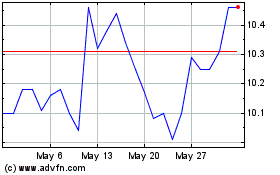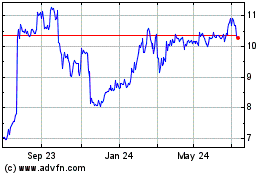U.K.'s Budgets Will Suffer From an EU Exit, Study Says
May 25 2016 - 3:30AM
Dow Jones News
LONDON—A British vote in favor of leaving the European Union
could thwart U.K. Treasury chief George Osborne's goal of closing
the nation's budget deficit by 2020, according to an analysis by a
nonpartisan think tank.
The Institute for Fiscal Studies said it found that a vote to
leave the EU in a referendum next month would likely slow the
economy, lowering tax receipts and pushing up government spending
over the next few years, according to an advance copy of the
analysis.
That could cause government borrowing to be between £ 20 billion
($29 billion) and £ 40 billion higher in the fiscal year ending in
March 2020 than it is forecast to be if the U.K. remains an EU
member, according to the analysis. That would leave Mr. Osborne
some way from his self-imposed goal of closing the nation's budget
deficit completely that same fiscal year, meaning new spending cuts
or tax increases would be needed to close the gap.
The deficit was at £ 76 billion for the fiscal year that ended
in March.
The study comes amid a debate in Britain over the economic
consequences of leaving the EU, as Britons prepare for the June 23
vote.
Prime Minister David Cameron, a close ally of Mr. Osborne, says
an exit from the 28-member bloc would hurt trade and investment.
But backers of Britain's exit, or Brexit, argue that Britain would
ultimately benefit from being outside the EU, where it would be
free of burdensome EU regulation and able to sign its own trade
deals with faster-growing parts of the world.
The U.K. treasury said this week in a new analysis that the
British economy would likely experience "a profound shock" if
voters decide to quit the EU, potentially causing "a marked
deterioration in economic prosperity and security."
The treasury's assessment of the potential short-term costs of
Brexit comes on the heels of similar warnings from the Bank of
England, the International Monetary Fund and the Organization for
Economic Cooperation and Development, all of which concur that
leaving the EU could damage the U.K.'s economic prospects by
damping trade and slowing investment.
The Institute for Fiscal Studies' report, released Wednesday,
says the precise scale of the fiscal consequences of a British exit
is uncertain, and will depend on whether the U.K. continues to make
a contribution to the EU budget to maintain access to the bloc's
single market for goods and services. Its estimate of extra
borrowing costs over the next few years assume the U.K.'s annual
contribution to the EU budget, net of payments Britain receives, is
halved, to around £ 4 billion annually. That's a similar
arrangement to Norway, which isn't in the EU but does pay for
single market access.
The Brexit-backing group Vote Leave responded to the institute's
analysis by saying overstates the economic risks associated with
leaving the EU and ignores the risks of remaining a member, given
the economic problems of the 19-nation eurozone at the EU's
core.
Write to Jason Douglas at jason.douglas@wsj.com
(END) Dow Jones Newswires
May 25, 2016 03:15 ET (07:15 GMT)
Copyright (c) 2016 Dow Jones & Company, Inc.
Pacific Current (ASX:PAC)
Historical Stock Chart
From Mar 2024 to Apr 2024

Pacific Current (ASX:PAC)
Historical Stock Chart
From Apr 2023 to Apr 2024
